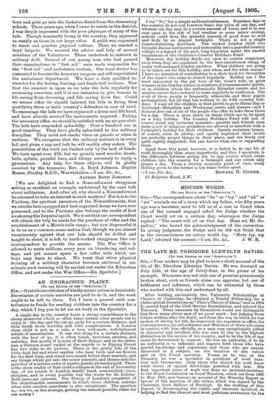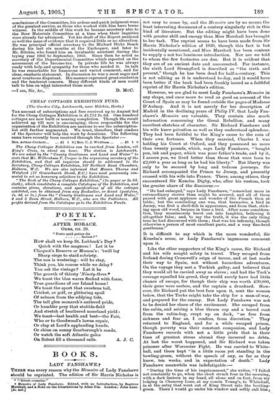pro THE EDITOR OP THE " SPECTATOR") Siu, — Your readers may
be glad to have a short account of the life of Mr. Theodore Llewelyn Davies. He was drowned on July 25th, at the age of thirty-four, in the prime of his strength. His career was not only one of promise prematurely broken short, such as friends alone can appraise, but one of fulfilment and influence, which can be estimated by those who worked with him and understood by all.
After holding successively two University Scholarships in Classics at Cambridge, he obtained a Trinity Fellowship for a philosophical dissertation on "Plato's Theory of Ideas," and in 1894 he passed head of the Civil Service Examination, and entered the Treasury. These successes by themselves would not distinguish him from many clever men of no great mark ; but judging from letters written after his death, and from the way in which he was spoken of during his life, he impressed his superiors in office, his contemporaries, his subordinates, and Ministers of State who came in contact with him officially, as a man very exceptionally gifted in character and intellect, who was sure to rise to the highest distinction in the service of his country, and to be the life of any cause he determined to support. He was an authority, if to be an authority is to influence and impress both those who have special knowledge and experience and those who are merely interested in a subject, on the taxation of site values and on the Fiscal question. Young as he was, in the Treasury he was a specialist in questions of local taxa- tion and Income-tax. Only those who shared his work know what stores of special knowledge perished with him. His first important piece of work was done as assistant-secretary to the Royal Commission on Local Taxation, which sat from 1896 to May, 1901, now famous on account of the Minority Report in favour of the taxation of site values, which was signed by the Chairman, Lord Balfour of Burleigh. In the drafting of this Report, in disentangling the rights and interests involved, in helping to find the clearest and most judicious expression for the conclusions of the Committee, his ardour and quick judgment were of the greatest 'service, as those who worked with him have borne witness. In the middle of this work he became secretary also to the Beer Materials Committee at a time when their inquiries were already far advanced. Yet his draft of the Report analysed sO well the mass of evidence that it required little or no alteration. He was principal official secretary to Sir Michael Hicks Beach during his last six months at the Exchequer, and later to Mr. Ritchie, who found him an invaluable assistant during the trying year 1902 to September, 1903. Since then he acted as secretary of the Departmental Committee which reported on the assessment of the Income-tax. In private life he was always ready with help and sympathy for those who needed it. In talk he was remarkable for humorous and varied comment, and for clear, emphatic statement. In discussion he was a most eager and most courteous disputant. His manner expressed great resolution and the tenderest concern. Many different kinds of men could talk to him On :what interested them most.
—I am, Sir, &e., D. Mee.







































 Previous page
Previous page